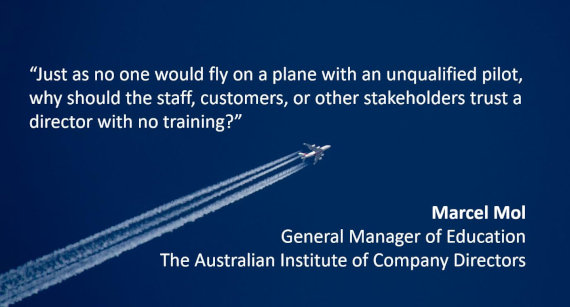|
|
|
|
|
|
|
|
|
Dear reader,
Welcome to the February 2021 edition of The Director's Dilemma. Each month this newsletter looks at a real-life scenario that happened to a board, perhaps to a board like yours, and considers a range of responses. The scenarios are de-identified to protect the individuals concerned.
This month we investigate the response of a good board to a bad situation and consider how to remove mud that has stuck to the reputation.
I have over twenty-two years' experience consulting to, and serving on, boards. It is a pleasure to share some of it with you in this newsletter and I would be even more delighted to share it with you when your board needs a performance review, strategy workshop, or director education session.
To read this email in a web browser, go to www.mclellan.com.au/newsletter.html and click on 'read the latest issue'. I hope you will enjoy the latest dilemma:

Dylan chairs a large charity that derives most of its income from government grants. A couple of years ago the board suspected fraud. This related to costs for unspecified IT Services from a company nobody knew. The fraud wasn’t sophisticated and the board soon had evidence their own CEO had fabricated the invoices and approved them.
The board reported the crime to the relevant authorities; the CEO was successfully prosecuted and sentenced to a term of incarceration. This, naturally, involved public proceedings and a small amount of coverage in the media.
The board instituted new practices for invoice creation and approval, enhanced the audit and governance committees, appointed a new CEO, and hoped the issue was finalised.
However, in a recent debrief after an unsuccessful grant application, a government employee told the new CEO that “the government would have liked to see some directors leave the board after the fraud to ‘atone’ for their poor oversight”. She has reported this back to him and asked for help.
Dylan is concerned. His board is diverse and each director brings a unique skill set. He can’t just remove and replace a few without weakening the board. He feels the board did well to detect the fraud which was miniscule compared to the company turnover. He knows some boards allow fraudsters to resign quietly for fear that the stigma may attach to the directors and company as well as the perpetrator. He felt that his board did the honourable thing by pursuing a conviction and return of as much money as possible. The new CEO believes maintaining the current board may cost more than the fraud.
What should Dylan do?
|
|
|
|
Larry's Answer
 Dylan, this is a serious situation. You just lost a major grant and now you’ve been informed that the government is unhappy with your board and wants a "sacrifice". Dylan, this is a serious situation. You just lost a major grant and now you’ve been informed that the government is unhappy with your board and wants a "sacrifice".
I’ve worked with several regulated boards in crisis who were severely impacted when they ignored criticism from the government. Government grantors can have a major impact if they believe your board is incompetent or in denial. The government will be sensitive to your board’s response.
Often boards will "circle the wagons" against outside threats who criticize their performance. Are you defensive? Do you minimize the issues? Do you resist taking any positive action in response? Here’s what I suggest:
1. Find out what the attitude of the government is regarding your board’s effectiveness. Listen don’t be defensive. Their perspective is important. Often the government will not be explicit. Take the issue very seriously.
2. Be proactive. How effective is your board in all areas of governance performance? Assess the board's effectiveness and individual director's performance. On your own, show the government that you are taking action to improve your board.
3. Take action in changing board attitudes, procedures, and director behaviour.
4. Refresh the board to fit your new performance criteria.
5. Aggressively communicate all your actions/results to the government and show a sincere desire to improve your board. Gain their acceptance.
The government will react more positively if they know you are taking their concerns seriously and making changes yourself. Your organization’s success is more important than maintaining board harmony.
Larry Cabaldon is President of the Private Directors Association, Orange County Branch. He is based in Irvine, California, USA.
|
|
|
|
Julie's Answer
 Government grant-giving organisations pride themselves on being good custodians of public monies. They are keen to avoid funding fraudsters. Government grant-giving organisations pride themselves on being good custodians of public monies. They are keen to avoid funding fraudsters.
It is galling when outsiders insist that a director should be replaced to 'atone' for something that happened when the whole board was in charge; it is also common and must be dealt with.
Armed with hindsight, Dylan and the CEO should go through the grant application and look carefully at what has been said about the board, the financial and operating controls, and the quality of the management team. These paragraphs can get out of date because people cut and paste from previous successful applications.
To win a grant now, they will need to be better worded, outline exactly how the controls found the fraud, explain how well credentialled the new audit chair is, and discuss the board's resolute protection of the company's funds, including the court case.
Dylan must also step up in his role as representative of the organisation and board; he needs to meet personally with the relevant government officials and let them know how well the board is performing and how its diverse skills balance is helpful.
Hopefully this is a single event and funding will resume. If grant applications continue to be unsuccessful Dylan and his directors should discuss bringing forward their succession plan and give the funders what they are asking for.
Board life is not always fair. Dylan's board have done their best and that may be their only reward and comfort in this situation.
Julie Garland McLellan is a non-executive director and board consultant based in Sydney, Australia.
|
|
|
|
Kevin's Answer
 Initial questions: Initial questions:
-
Did the Board appropriately communicate, in a timely manner, with its key stakeholder on the theft? (Governments don't like surprises);
-
Is it really a high-performing Board or is it just viewed that way by the Board itself? (Board Assessment?); and
-
Does the Board have a succession plan?
The Chair and CEO should meet with senior government representatives to review the steps taken by the Board/organization (e.g. audit committee best practices - fraud prevention plan), clarify the Governments concerns, and expected outcomes to resolve this situation. Is it a case of providing assurance that the risk of re-occurrence is low and that there is an effective Board in place; or does the Government require Board Members to resign solely for political purposes.
It is not normally the Governments role to appoint or terminate charitable Board Members; nor is it appropriate to hold the Board / organization to ransom by withholding funding unless there is a clear loss of confidence in the Board.
If the Government is genuinely concerned about the calibre of Board Members than the Board needs to carefully review its own leadership and its Members skills and experience. Then make changes as appropriate. This should then satisfy the Government and restore funding.
If, however the Government believes, for political purposes, there needs to be Board Member resignations, the Chair must step-up and first offer his resignation. Ultimate accountability lies with the Chair. The remaining Board Members should then decide if they will remain on the Board or offer their resignations in light of the political interference.
With either scenario the charity should not suffer loss of funding.
Kevin Hall is Chair and Board Member at Youthlink Calgary Police Interpretive Centre, Board Member at STAT Healthcare Corporation and Calgary Highlanders Regimental Finds Foundation, and Global Board Member and Managing Partner Canada at AltoPartners. He is based in Calgary, Alberta, Canada.
Julie on TV (again) - It was great to be invited to speak on Ticker TV about who gets to be on boards and how people can build a board career. Watch my interview.
Do you know where to focus for maximum impact? - boards often struggle to get cut through and drive company performance. They work hard, then they work harder, then call in a consultant who recommends some changes, then they work harder still.
If that sounds like your board, don’t worry. It is likely that you have simply been focusing on the wrong stuff. I have made a diagnostic tool that might help you to prioritise the actions that will free your board from the drudgery and allow you to maximise your impact. Try out the diagnostic tool.
Call me afterwards for help with revitalising your board.
|
|
|
|
Book Review – Earn Your Seat on a Corporate Board by Jill Griffin

I am often asked to advise directors on how to develop their board careers. As a result I have become an avid reader of books on how to get onto boards. This one truly stands out from the crowds written on the topic.
The book is written around 7 actions. The 13 questions in the first chapter analyse your readiness for a board seat as well as your character and emotional fit with board service. I know many 'one term and out' directors who were able to get onto boards only to discover that they preferred executive life to the team-based and often frustrating boardroom; they would have been saved a few uncomfortable years by these simple questions.
Action 7 is also often overlooked by those eager to build a full portfolio who then find that they have accepted boards that now block their progress in accessing the boards where they can truly have an impact.
The book is very business-like and no-nonsense in its tone, a lot like the author, and is also very American. However, the actions will all work here in Australia and in other countries. I would recommend reading 'The Perfect Corporate Board' by Adam J Epstein as well as this book – the combination of the two would set any director onto a good path to success.
Available on amazon.com
See Julie Speaking at International NFP Board Summit
I have been invited to speak at the founding conference of the Society of Nonprofit Board Directors. What makes this conference different from many other non-profit events and resources out there is that the programme is SPECIFICALLY for board members and it was built with the input of over 50 board directors of nonprofits from around the world!
If you are looking for that edge to help you drive progress on the organisation's mission, see your talents fully utilised, and build an impact sign up at https://nonprofitboardsummit.org.
I'm speaking at 7.40am Sydney time on Saturday 27 February (3.40pm local time on Friday 26). I'll be sharing how to set expectations and build a progression plan, how to avoid bad behaviour by board members, and how to avoid the four key mistakes that undermine board impact.
Inspirational quote for February

A note on names - A few readers have asked me where I find the names for the protagonists in each case study; I 'borrow' them from people I meet or things that I read. Dylan is an ancient Welsh name and means 'son of the sea' or son of the second wave'. Our protagonist Dylan must create a successful second wave of renewed confidence and restored reputation if the company is to continue to provide its much-needed services.
This newsletter - If you have any ideas for improving the newsletter please let me know. If you are reading a forwarded copy, please visit my website and sign up for your own subscription.
Suggestions for dilemmas - Thank you to all the readers who have suggested dilemmas. They are greatly appreciated. I will answer them all eventually. I could not write this newsletter without your help and without the generous help of all the experts who respond each month to the case studies.
Be a contributor - If you would like to attempt a response to the dilemmas for publication you will be most welcome. Simply reply to this email and let me know.
Let's connect - I use LinkedIn to share information about boards and directorship with my friends and acquaintances. If you use LinkedIn and we are not yet connected I will welcome a connection from you. You can find me at linkedin.com/in/juliegarlandmclellan.
Let me help you - If you would like me to speak to or train your board, staff, audience and/or group please contact me at julie@mclellan.com.au.
Farewell until the next issue due 1 March 2021. I look forward to greeting you again then. In the interim I hope you will enjoy health, happiness and hard work: Enjoy governing your companies; we are privileged to do what we do and every day is a blessing!
Best regards,
Julie

Main Photo by Startup Stock Photos from Pexels
Quote Photo by Joyce Ong
Photo Credits: Personal images in this newsletter are provided courtesy of the contributors, course attendees and conference participants.
Disclaimer:
The opinions expressed above are general in nature and are designed to help you to develop your judgement as a director. They are not a definitive legal ruling and do not constitute legal advice. Names and some circumstances in the case study have been changed to ensure anonymity. Contributors to this newsletter comment in the context of their own jurisdiction; readers should check their local laws and regulations as they may be very different.
Privacy: I am privileged to have your contact details and keep them as safely as possible. I will alert you if they are ever accessed by any unauthorised person (the technical staff at ayuda help with publishing and issuing the Director's Dilemma and have access so they can send the newsletters to you). I do not sell your details to anyone; they are kept only for the intended purpose - sending you this newsletter and helping to build the judgement of company directors by providing a safe way to consider potential responses to real life events.
|
|
|
|
|
|
|


 Dylan, this is a serious situation. You just lost a major grant and now you’ve been informed that the government is unhappy with your board and wants a "sacrifice".
Dylan, this is a serious situation. You just lost a major grant and now you’ve been informed that the government is unhappy with your board and wants a "sacrifice". Government grant-giving organisations pride themselves on being good custodians of public monies. They are keen to avoid funding fraudsters.
Government grant-giving organisations pride themselves on being good custodians of public monies. They are keen to avoid funding fraudsters. Initial questions:
Initial questions:

